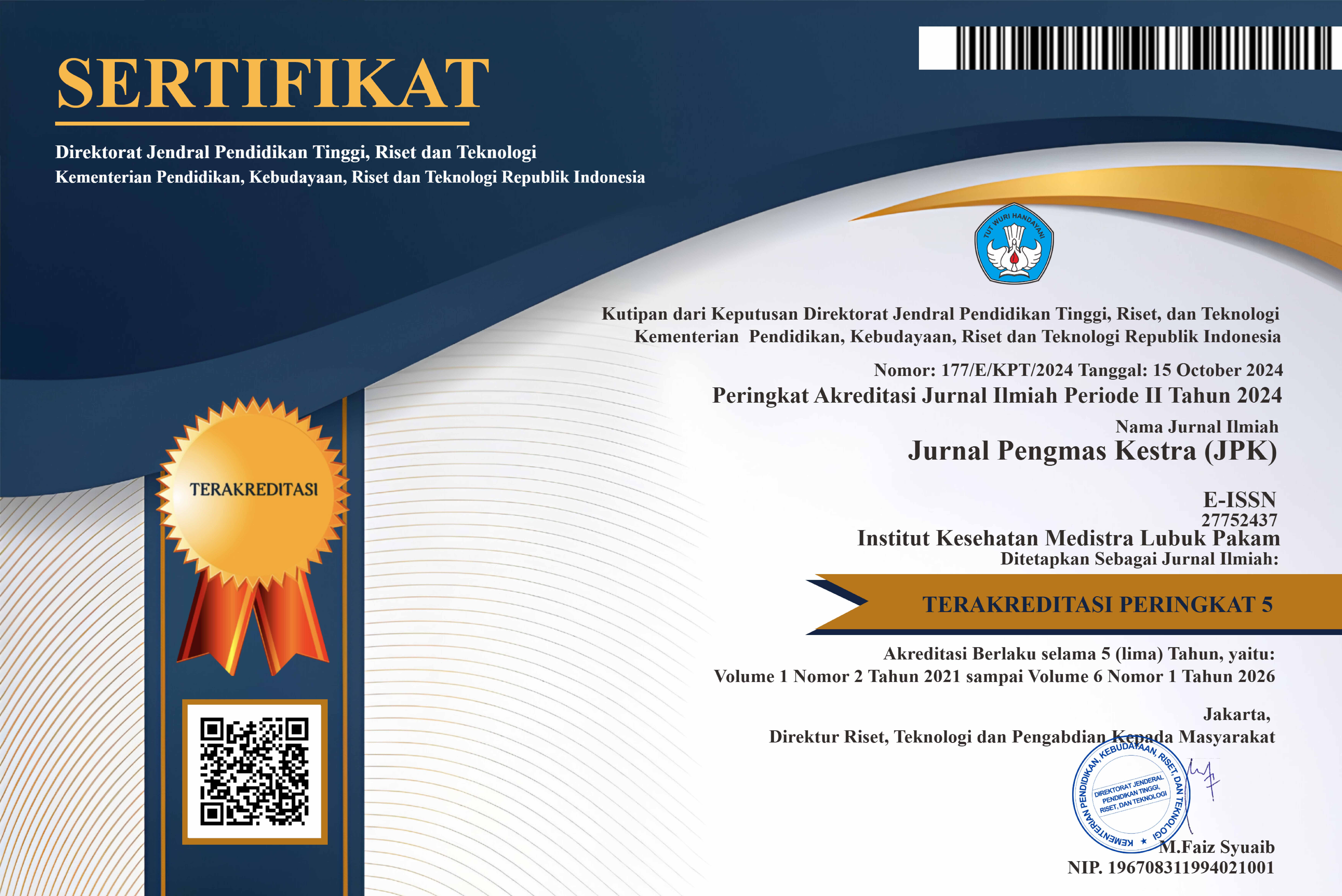Community Education on Neonatal Visits: Reducing Risks, Enhancing Hope
DOI:
https://doi.org/10.35451/jpk.v4i2.2434Keywords:
Community education, Neonatal visitsAbstract
The health of newborns is one of the key indicators of societal well-being. Neonatal visits play a crucial role in preventing health complications in infants. This article presents the outcomes of a community service program focused on educating the importance of neonatal visits. The community service activity was conducted at Mars Clinic, Deli Serdang Regency, North Sumatra, on November 29, 2024, involving 22 mothers of newborns. The primary goal of this community service initiative was to enhance the knowledge and awareness of the community regarding the significance of neonatal visits in preventing health risks in newborns. The activity was carried out using a participatory approach involving healthcare workers, community health volunteers, and the general public. A significant improvement was observed in the 'Good' category, increasing from 9.09% to 72.73%, alongside a drastic decrease in the 'Poor' category from 27.27% to 0%. The average increase in pre-test to post-test scores is 17.27 points, demonstrating the effectiveness of the educational methods implemented. The conclusion of this program underscores that community education can significantly reduce neonatal health risks and foster hope for a healthier generation.
References
J. E. Lawn, Z. A. Bhutta, C. Ezeaka, and O. Saugstad, “Ending Preventable Neonatal Deaths: Multicountry Evidence to Inform Accelerated Progress to the Sustainable Development Goal by 2030,” Neonatology, vol. 120, no. 4, pp. 491–499, Aug. 2023, doi: 10.1159/000530496.
I. Nurhayati, R. P. Wulan, S. Kebidanan, and Y. Madani, “Faktor Yang Mempengaruhi Ibu Nifas Dalam Melakukan Kunjungan Neonatal,” Jurnal Kesehatan Madani Medika (JKMM), vol. 9, no. 1, pp. 21–30, May 2019, Accessed: Dec. 16, 2024. [Online]. Available: https://doi.org/10.36569/jmm.v9i1.26
S. Majumder, Z. Najnin, S. Ahmed, and S. U. Bhuiyan, “Knowledge and attitude of essential newborn care among postnatal mothers in Bangladesh,” J Health Res, vol. 32, no. 6, pp. 440–448, Dec. 2018, doi: 10.1108/JHR-05-2018-0015.
A. Rahmawati, “Faktor-Faktor Yang Berhubungan Dengan Perilaku Ibu Dalam Kunjungan Neonatal Di Wilayah Kerja Puskesmas Kedungmundu Semarang,” Jurnal Kesehatan Masyarakat (e-Journal), vol. 7, no. 2, pp. 64–72, 2019, [Online]. Available: https://doi.org/10.14710/jkm.v7i2.24782
O. Adefolalu, O. Kanma-Okafor, and M. Balogun, “Maternal knowledge, attitude and compliance regarding immunization of under five children in Primary Health Care centres in Ikorodu Local Government Area, Lagos State,” Journal of Clinical Sciences, vol. 16, no. 1, p. 7, 2019, doi: 10.4103/jcls.jcls_55_18.
Kemenkes RI, Pedoman pelayanan antenatal, persalinan, nifas, dan bayi baru lahir di Era Adaptasi Baru. 2020.
W. You, “The nursing-midwifery workforce size significantly influences the reduction of neonatal mortality rate,” Journal of Neonatal Nursing, vol. 30, no. 6, pp. 789–797, Jul. 2024, doi: 10.1016/j.jnn.2024.07.006.
S. Wahyu Utami, N. Cahyani Ari Lestari, and S. Tinggi Ilmu Kesehatan Abdi Persada Banjarmasin, “pelaksanaan continuity of care pada neonatus dan bayi di era pandemi covid-19 di wilayah Puskesmas Banjarmasin Indah Tahun 2022.” [Online]. Available: https://qjurnal.my.id/index.php/abdicurio
I. Nurhayati and R. W. Purnami, “Faktor Yang Mempengaruhi Ibu Nifas Dalam Melakukan Kunjungan Neonatal,” 2018, Accessed: Oct. 09, 2024. [Online]. Available: https://doi.org/10.36569/jmm.v9i1.26
M. C. B. Oscar, D. A. da S. Simão, G. de C. Ribeiro, and E. W. R. Vieira, “Neonatal visits in the first week of life in primary care: low prevalence and related factors,” Rev Bras Enferm, vol. 75, no. 4, 2022, doi: 10.1590/0034-7167-2021-0295.
M. Pelayanan et al., “AMMA?: Jurnal Pengabdian Masyarakat,” vol. 3, no. 11, 2024.
L. A. Arini and A. T. Astuti, “Praktek pelayanan kebidanan komprehensif berbasis konsep kearifan budaya lokal bali,” 2020.
A. Yugistyowati and F. S. Fatimah, “Evaluasi Program Pelaksanaan Konseling Perawatan Neonatal Berdasarkan Teori Precede-Proceed.” [Online]. Available: http://ejournal.almaata.ac.id/index.php/IJHAA
A. Setiawan and Y. Christiani, “Integrated Health Post For Child Health (POSYANDU) As A Community-Based Program In Indonesia: An Exploratory Study,” Jurnal Keperawatan Indonesia, vol. 21, no. 2, pp. 2354–9203, 2018, doi: 10.7454/jki.v21i2.600.
N. Yadav, H. Vyas, Mamta, and M. Goyal, “Effectiveness of prenatal lactation counseling on breastfeeding practices, breast engorgement, and newborn feeding behavior among postnatal mothers at a teaching institution,” J Family Med Prim Care, vol. 11, no. 3, pp. 1146–1151, Mar. 2022, doi: 10.4103/jfmpc.jfmpc_1217_21.
R. D. Maria, M. Fellina, S. Prima, and N. Bukittinggi, “Gambaran Pengetahuan Ibu Yang Mempunyai Bayi Usia 1-7 Hari Tentang Kunjungan Neonatus Di Puskesmas Padan Kandi Kabupaten 50 Kota,” Bukit Tinggi, Jul. 2014. Accessed: Dec. 16, 2024. [Online]. Available: https://doi.org/10.35730/jk.v5i1.212
K. Osaki et al., “Maternal and Child Health Handbook use for maternal and child care: A cluster randomized controlled study in rural Java, Indonesia,” Journal of Public Health (United Kingdom), vol. 41, no. 1, pp. 170–182, Mar. 2019, doi: 10.1093/pubmed/fdx175.
R. Carshon-Marsh et al., “Child, maternal, and adult mortality in Sierra Leone: nationally representative mortality survey 2018–20,” Lancet Glob Health, vol. 10, no. 1, pp. e114–e123, Jan. 2022, doi: 10.1016/S2214-109X(21)00459-9.
H. G. Abera, “The Role of Education in Achieving the Sustainable Development Goals (SDGs): A Global Evidence Based Research Article,” International Journal of Social Science and Education Research Studies, vol. 03, no. 01 Januari, pp. 67–81, Jan. 2023, doi: 10.55677/ijssers/V03I1Y2023-09.
F. H. Alshakhs, N. E. Katooa, H. A. Badr, and H. A. Thabet, “The Effect of Alternating Application of Cold and Hot Compresses on Reduction of Breast Engorgement Among Lactating Mothers,” Cureus, Jan. 2024, doi: 10.7759/cureus.53134.
Downloads
Published
Issue
Section
License
Copyright (c) 2024 Novita Br Ginting Munthe, Iskandar Markus Sembiring

This work is licensed under a Creative Commons Attribution 4.0 International License.
Copyright in each article is the property of the Author.




















